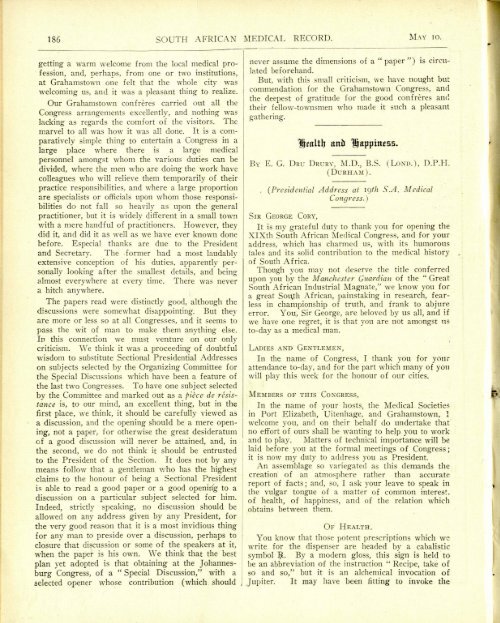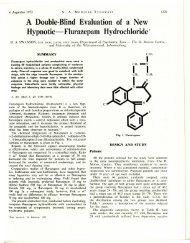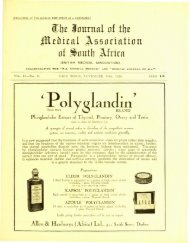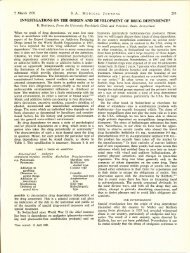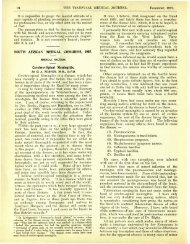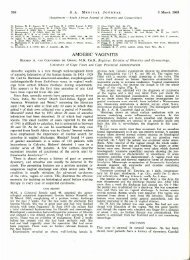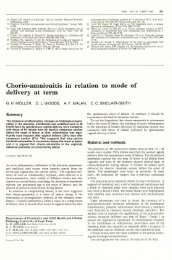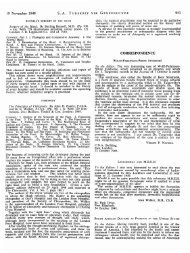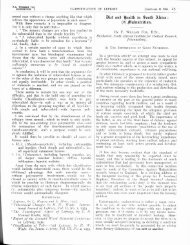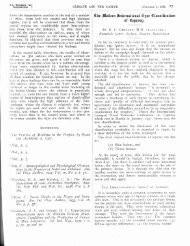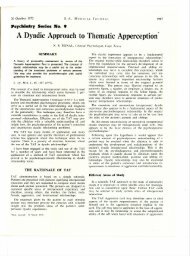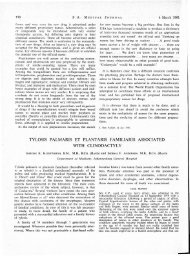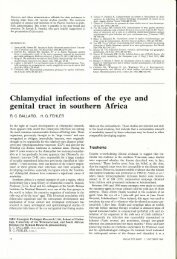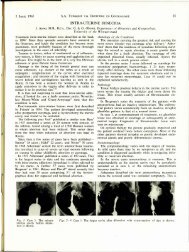1.2 HEALTH AND HAPPINESS. E.G. Dru Drury, M.D., B.S. D.P.H.pdf
1.2 HEALTH AND HAPPINESS. E.G. Dru Drury, M.D., B.S. D.P.H.pdf
1.2 HEALTH AND HAPPINESS. E.G. Dru Drury, M.D., B.S. D.P.H.pdf
You also want an ePaper? Increase the reach of your titles
YUMPU automatically turns print PDFs into web optimized ePapers that Google loves.
186 soutH AFRICAN MEDICAL RECORD. MAY 10.<br />
getting a warm welcome from the local medical profession,<br />
and, perhaps, from one or two institutions,<br />
at Graham town one felt that the whole city was<br />
welcoming us, and it was a pleasant thing to realize.<br />
Our Grahamstown confreres carried out all the<br />
Congre s arrangement excellently, and nothing- was<br />
lacking a regards the comfort of the vi itors. The<br />
marvel to all was how it was all done. It is a comparatively<br />
simple thing to entertain a Congress in a<br />
large place where there is a large medical<br />
personnel among. t whom the various duties can be<br />
divided, where the men who are doing the work have<br />
colleagues who will relieve them temporarily of their<br />
practice responsibilities, and where a large proportion<br />
are specialists or officials upon whom those responsibilities<br />
do not fall so heavily as upon the general<br />
practitioner, but it i widely different in a small town<br />
with a mere handful of practitioners. However, they<br />
did it, and did it as well as we have ever known done<br />
before. Especial thanks are due to the President<br />
and Secretary. The .former had a most laudably<br />
extensive conception of his duties, apparently personally<br />
looking after the smallest details, and being<br />
almost everywhere at every time. There was never<br />
a hitch anywhere.<br />
The papers read were distinctly good, although the<br />
discussions were somewhat disappointing. But they<br />
are more or less so at all Congresses, and it seems to<br />
pass the wit of man to make them anything else.<br />
In this connection we must venture on our only<br />
criticism. We think it was a proceeding of doubtful<br />
,'visdom to substitute Sectional Presidential Addresses<br />
on subjects selected by the Organizing Committee for<br />
the Special Discussions which have been a feature of<br />
the last two Congres es. To have one subject selected<br />
by the CommiHee and marked out as a piece de Tesistance<br />
is, to our mind, an excellent thing, but in the<br />
first place, we think, it should be carefully viewed as<br />
a discussion, and the opening should be a mere opening,<br />
not a paper, for otherwise the great desideratum<br />
of a good discussion will never be attained, and, in<br />
the second, we do not think it should be entrusted<br />
to the President of the Section. It does not by any<br />
means follow that a gentleman who has the highest<br />
claims to the honour of being a Sectional President<br />
is able to read a good paper or a good opening to a<br />
discussion on a particular subject selected for him.<br />
Indeed, strictly speaking, no discussion should be<br />
allowed on any address given by any President, for<br />
the very good reason that it is a most invidious thing<br />
for any man to preside over a discussion, perhaps to<br />
closure that di cussion or some of the speakers at it,<br />
when the paper is his own. Vie think that the best<br />
plan yet adopted is that obtaining at the J ohannesburg<br />
Congress, of a "Special Discussion," with a<br />
selected opener whose contribution (which should<br />
never assume the dimensions of a " paper") is circulated<br />
beforehand.<br />
But, with this small critici m, we have nought but<br />
commendation for the Grahamstown' Congress, and<br />
the deepest of gratitude for the good confreres and<br />
their fellow-townsmen who made it such a pleasant<br />
gathering.<br />
'italtb anb 'iappintss.<br />
By E. G. DRu DRURY, M.D., B.S.<br />
(DURHAM).<br />
(LOND.), D.P.H.<br />
. (PTesidelltial Address at 19th SA. Medical<br />
CongTess.)<br />
SIR GEORGE<br />
CORY,<br />
It is my grateful duty to thank you for opening the<br />
XIXth South African Medical Congress, and for your<br />
address, which has charmed us, with its humorous<br />
tales and its solid contribution to the medical history<br />
of South Africa.<br />
Though you may not deserve the title conferred<br />
upon you by the M,a!nchesteT Guardian of the" Great<br />
South African Industrial Magnate," we know you for<br />
a great Sou,th African, pain taking in research, fearless<br />
in championship of truth, and frank to abjure<br />
error. You, Sir George, are beloved by us all, and if<br />
we have one regret, it is that you are not amongst us<br />
to-day as a medical man.<br />
LADIES <strong>AND</strong> GENTLEMEN,<br />
In the name of Congress, I thank you for your<br />
attendance to-day, and for the part which many of you<br />
will play this week for the honour of our cities.<br />
MEMBERS OF THIS COKGRESS,<br />
In the name of your hosts, the Medical Societies<br />
in Port Elizabeth, Uitenhage, and Grahamstown, 1<br />
welcome you, and on their behalf do undertake that<br />
no effort of ours shall be· wanting to help you to work<br />
and to play. Matters of technical importance will be<br />
laid before you at the formal meetings of Congress;<br />
it is now my duty to address you as President.<br />
An assemblage so variegated as this demands the<br />
creation of an atmo. phere rather than accurate<br />
report of facts; and, so, I ask your leave to speak in<br />
the vulgar tongue of a matter of coml11on interest.<br />
of health, of happiness, and of the relation which<br />
obtains between them.<br />
OF <strong>HEALTH</strong>.<br />
You know that those potent prescriptions which we<br />
write for the dispenser are headed by a cabalistic<br />
symbol JJ.. By a modern gloss, this sign is held' to<br />
be an abbreviation of the instruction" Recipe, take of<br />
so and so," but it is an alchemical invocation of<br />
Jupiter. It may have been fitting to invoke the
MAY 10. SOUTH AFRICAN MEDICAL RECORD. 187<br />
thunderer before consuming a soul-perturbing bolus of<br />
jalap, but a happier tradition makes doctors the servants<br />
of .Apollo, the fleet-footed, light-dispensing Lord<br />
of learnmg. "Th~ poets," wrote Franci Bacon of<br />
Yerulam, " did well to conjoin music and medicine in<br />
Apollo, because the office of medicine is but to tune<br />
this curious harp of man's body, and reduce it to harmony."<br />
We accept thi5 de cription of our profe ional aim<br />
unreservedly; yet, as you look round on this body of<br />
medical men anJ women, disciplined to cure quickly,<br />
safely, and pleasantly-a cnrare cita, tute, et iu-cunde" I<br />
-your memories may revive a contrasted scene. A<br />
year ago the Cathedral of St. Michael and St. Georae<br />
was twice packed with some six hundred persons, co~fessedly<br />
not well, who had collected to the piping of<br />
a peripatetk healer. It was, to a lover of humanity,<br />
a moving sf,ectacle. and, without a-ttempting to evaluate<br />
its implicit doctrine that holiness makes for health,<br />
or to trace the paths by which an idea emotionally<br />
embraced. can influence the chemistry a~d physics o'f<br />
the body. we are forced to ask why two such bodies of<br />
people, (,f healers and unhealed, fail to help each other<br />
infallibly. "Vhy does so much unresolved disharmony<br />
of body exist? Rejecting the cheap gibe that the<br />
healers are too full of knowledge to be wi e, there is a<br />
twofol1 answer to this question. The reason of illhealth<br />
is to be found either in the conditions under<br />
which the curious harp of man's body has to give<br />
forth Jts melody, or el e in the technique of the player<br />
upon his instrument. In brief, there exist defective<br />
publi..: health and faulty personal habits.<br />
OF PUBLIC <strong>HEALTH</strong>. .<br />
There is no need to elaborate the theme that surroundings<br />
influence health, for you are all believers<br />
or ratepayers, but you will admit that civilized man,<br />
massed together in compact colonies, has not a burning<br />
conviction of the importance of communal health.<br />
To medical officer to a military camp would deny that<br />
this is true of individuals; and, as regards the State,<br />
it is easier to-day, eighty years after the foundations<br />
of public health were laid by Chadwick, Simon and<br />
others, to persuade the Treas}lry to part with money<br />
for scab eradication or for Singapore than to grant<br />
aid for medical research.<br />
Suppose that, as a community, we determined to<br />
guard ourselves against those prolific, lowly organisms<br />
which, taking advantage of air, food, water, and<br />
insect parasites, live an unnatural life at our expense,<br />
so that there was an end to the preventable fevers<br />
188 SOUTH AFRICA MEDICAL RECORD. MAY 10.<br />
OF <strong>HAPPINESS</strong>.<br />
The correlative of health or physical harmony is<br />
happiness or mental harmony. By happiness must be<br />
understood, not the pleasurable satisfaction of appetite,<br />
nor the in tinctive avoidance of boredom, repression,<br />
overwork, or pain, but a cu ·tomary state of joyousness,<br />
mirthfulness, merriment, or, in an older world.<br />
of hilarity. And the question which underlies this<br />
address, and which justifies or stultifies our professional<br />
activities, is, "Should we be happy if we<br />
were healthy?" Does not our own speech, which<br />
derives from a common stock the words health,<br />
wholeness, wholesomeness, and holiness-does not that<br />
very word sanitation, which implies anity, prepare us<br />
to answer "Yes"? Health and happiness are not<br />
identical, but clo ely partnered, as are foundation and<br />
superstructure. Dr. Bridges, himself an alumnu of<br />
Bart's, wrote in "The Birth of Love":<br />
" Who builds a ship must first lay down the keel<br />
Of health, whereto the ribs of mirth are wed."<br />
How clearly experience demonstrate the inverse<br />
relation of ill-health to unhappines! An<br />
abscess under your tooth will spoil your form in a<br />
game of chess. Lesser defects of health also<br />
have their effect on happiness. Catarrh of the<br />
nasal sinuses decreases the power to concentrate<br />
on, say, Hegel's "Shorter Logic"; an<br />
over-active thyroid gland makes your temper a<br />
family trial; whilst the fermenting- presence of certain<br />
bacterial flora in what Harold Mencken 1 call that<br />
"thirty-foot v£,a tdolorosa running from the pylorus<br />
to the sigmoid flexure" delays development in some<br />
children and worries badly brought-up citizen. Now<br />
worry and happiness will not work together, and the<br />
curious may have noticed someone who was once preoccupied<br />
with intestinal problems and, anxieties improve<br />
in health and happiness on falling in love, taking<br />
up Child Welfare work, or painting most primitive<br />
pictures. For those abominable perverts who" enjoy<br />
bad health," using its possession for a pedestal, and<br />
its symptoms for a staple of cQnversation, the only<br />
cure would be a ojourn in Samuel Butler's<br />
"Erewhon," where physical ills were a title to penal<br />
servitude; whilst the ghouls who sugge t that yOll<br />
are looking rotten, or who retail the awful cases they<br />
have known just like yours, can never be sufficiently<br />
execrated.<br />
It may be objected that men h~ve achieved good<br />
work in spite of disease-witness the tuberculous<br />
R. L. Stevenson; even immortal work, as did the<br />
phthisical Keats. We are exhorted in places where they<br />
sing that suffering makes for character, just as infection<br />
may result in immunity. That it may do so is fine<br />
testimony to the indomitable spirit in man, which resists<br />
alike deformation of mind and of body. Yet,<br />
we may hold that man would develop to a full-rounded<br />
maturity under gentler goads than "the ting and<br />
arrows of outrageous fortune." If it needs suffering<br />
to call out our reserve of power, let us endure it<br />
stoically, rather than be "tame in Earth's paddock<br />
as her prize." Meanwhile we do know as physiologists<br />
and as students of historical reforms that painful<br />
stimuli are more potent than pleasurable ones. A<br />
foozled drive, colic, jealousy, or provincial taxation<br />
lead to more violent reactions than do a long put, a<br />
dinner of herb' where love is, or a satisfactory<br />
balance sheet. Granted that pain is pCl'll1tm, punishment<br />
following on a sufficient breach of laws-of law~<br />
not thundered from a mountain-topJ but found to<br />
be inherent in the structure of thi curious harp-we<br />
may regard pain as a schoolmaster from whom we<br />
may have to learn, if we need the lesson.<br />
THE SECRET OF<br />
<strong>HAPPINESS</strong>.<br />
Is there any secret of happiness? I believe that there<br />
is, and, before sitting down, I shall offer for your<br />
criticism a formula, which I trust you will not find<br />
"neat, plausible, and wrong." For the moment I<br />
.make confe sion of my faith, that in spite of the<br />
anxieties which encompass Congress, life is an increasingly<br />
happy adventure.<br />
A biologist who wished to tudy happiness experimentally<br />
would concentrate upon specimens of happy<br />
people. Such a ,student would soon note that the<br />
sources of happiness vary with the playing of the<br />
successive acts of the human drama. Glance briefly<br />
at the seven ages of man' "strange eventful history."<br />
THE<br />
INFANT.<br />
Act I shows" the infant new to earth and sky." He<br />
comes into life like a profiteer into society, a get-richquick<br />
person of whose newly acquired organs only the<br />
heart, liver, kidneys and a few nerve tracts have had<br />
any rehearsals at all. At his peril he must play his<br />
part without delay. His respiratory centre comes into<br />
action like a roaring exhaust; his first es ays with Cl.<br />
remarkably simple diet are tentative and unconvincing;<br />
the limits within which his life can be carried on are<br />
sharply defined.<br />
The purposive urge, the "horme," of life has constructed<br />
this infantile harp and set it down in the<br />
universal ochestra to play its part, harmoniously if<br />
it may be. At birth the creative impulse is prodigious<br />
but already losing momentum, as does a bullet after<br />
leaving the muzzle of a rifle. Consider his height.<br />
Before birth, the original length has increased five<br />
hundred times; after birth, it will multiply less than<br />
four times in twenty odd years, and will thereafter<br />
cease. His muscular endurance relative to his weight<br />
is notoriously great at birth. His intelligence will<br />
reach'its maximum" quotient" at seventeen, and cannot,<br />
according to our te ts, thereafter be increased, but<br />
only enriched in content through extended experience.<br />
Included in the powers of the curious harp of the<br />
infant is the power which, we hold, distinguishes man<br />
from all his fellow animals, of self-awareness. The<br />
beginnings of self-consciousness in the child are on a<br />
level with animal intelligent purpose, and reveal themselves<br />
as certain simple needs. The bottle, the<br />
layette, and the safety-pin conveniently symbolize the<br />
satisfaction of his need of food, of warmth, and .of<br />
avoidance of discomfort. He has an inborn tendency
~L\y 10. SOUTH AFRICAN MEDICAL RECORD. I 9<br />
to satisfy his needs and avoid pain, and since,<br />
obviously, he does not think out a plan, we call these<br />
tendencies hereditary instincts. To tender him an<br />
unvaried adequate environment is to secure domestic<br />
peace; to offer experimental variation is to educe the<br />
clamour of a household tyrant, and reveal the baby<br />
as a supreme egoist. At this period his memory is<br />
stored with unconscious images, which mould the<br />
character of this conservative infant.<br />
The next stage is marked by the appearance of<br />
desire. ·As the Vedas say, "Desire in the beginning<br />
came upon her, which was the first eed of thought."2<br />
But desire is too often frustrated by the nature of<br />
things, and by watchful guardians, and so the next stage<br />
of mental growth is reached. As a witty contributor<br />
to the Athen(1;1wm wrote, "intellect appears only when<br />
the will is frustrated, and is the measure of its frustration.<br />
Yes, intellect is a kind of cunning which<br />
thrives on frustration."3 You will call this a halftruth,<br />
yet it is borne witness to by our language,<br />
which derives from one root the words "cunning,"<br />
"kenning," "knowing," and "kingship."<br />
Thus, from needs, desires, intelligent planning, and<br />
above all from memory, is born the elf-consciousnes<br />
of the man child, the philosophical empiricist.<br />
The baby is the typical individuali t. You may hear<br />
an articulate infant mind speaking in Mr. Maarten<br />
Maarten's "God's Fool." Elias Lo sell, of Koopstad,<br />
had lost his sight and much of his mental power from<br />
traumatic meningitis in childhood. He says to his<br />
devoted nurse, "I should like to love everybody, only<br />
that it seems like loving nobody. But I love you best,<br />
]ohanna, except myself. I-I love myself very<br />
much, ] ohanna.... I think I should like to love you<br />
better, ]ohanna, than I love myself. But I love my elf<br />
very much. And I think I would rather have myself<br />
happy, than anybody el e' happine s." The author<br />
adds, "Elias was about twenty when he thus spoke.<br />
He was too foolish, not to distinguish better between<br />
what is and what we suppose to be."<br />
The parallel between Elias, infantile in mentality,<br />
and the individual who promotes his own advantage<br />
by making a corner in building materials, or foodstuffs<br />
needed by others, needs no stressing.<br />
A baby's happiness may be summarized as lying<br />
in self-fulfilment.<br />
THE SCHOOL Boy.<br />
Between Acts I and 2, as in legitimate drama, year<br />
pas -seven, according to the Education Departmentof<br />
which four at lea t are inaccessible to con cious<br />
memory. In them the delightful harmonies of :l<br />
happy temperament are educed: or, on the contrary,<br />
defects and disharmonies of intellect and character are<br />
revealed. The audience notices at this period two<br />
main activities. There i the mastery of bodily tricks<br />
called co-ordinations of movement, the habits of elfpreservation<br />
of working and playing at work ; and<br />
there is the more difficult art of speaking, of using<br />
nouns and verbs, and of attaching a proper ignificance<br />
to the e device. fOT repr04ucin~ and pre ~rvin~ the<br />
3<br />
fruits of experience. In either case there is a tendency,<br />
either to accurate imitation of conventional usage or to<br />
characteristic individual modifications, delightful or<br />
perverse.<br />
During school life these activities intensify. He<br />
may develop into a handy-man, an amateur electrician<br />
and plumber, an athlete or happy Eau, such as ] ohn<br />
Leech's Englishman, who says "What a fine day!<br />
Let's go and shoot omething." Hi instinct of<br />
curiosity turning outwards on to things, he dissects<br />
and reassembles clock and bicycles, contrive bombs<br />
and fireworks, and work at the bench of carpenter<br />
and chemist. \Vith luck, this curio ity may la t<br />
through life, as the habit of scientific research, which<br />
is but the art of answering one's own que tions, instead<br />
of bothering other people. He will collect textbook<br />
and monographs and books of adventure.<br />
Under different impulses, his curiosity may turn<br />
inwards, to his own reactiuns, and he becomes expert<br />
in speech or in that silent speech we name thought.<br />
He may become a poet, and react to life with senti~<br />
ment and sonnets, or a scholar of erudition and verbal<br />
preciosity, or that often unhappy mi fit, a genius<br />
amongst the Philistine. Happie t is he who combines<br />
in him elf a due proportion of out ide intere ts<br />
and elf-knowledge, tinctured by a sen e of humour.<br />
The happiness of the school-boy lies in continued<br />
self-development and in discovery of that ystem we<br />
call reality. He learns from the fallible powers of<br />
the hou e and the form room. He learn from the<br />
repositories of tribal learning called books, in respect<br />
of which D. H. Lawrence utters a timely warning;<br />
"I count it a mi take of our mistaken democracy that<br />
every man who can read print is allowed to believe<br />
that he can read all that i printed."4 There i , finally,<br />
the not unmixed happines of having his private angle'<br />
rounded off by contact with the crowd of his fellows.<br />
Protective mimicry will make him conform to type<br />
and observe the totems and taboos of the tribe, and<br />
the code of behaviour which will later make him a<br />
fit member of his regiment, his club, or his profession.<br />
Philosophically he is a pragmatist.<br />
THE LOVER.<br />
Again years pas before the curtain ri es on Act 3,<br />
years spent in learning to earn a living and become<br />
an embryo citizen. In ome acting ver ion of life,<br />
the lover's part is cut out, a in the clas ical example<br />
of Humboldt, indu triou writer of many volume<br />
on " the COS1110S." There i the le s need to epitomize<br />
Act 3 for you, for not only does the whole world love<br />
a lover, pester him with peeping curiosity and penalize<br />
him when married with an increase of every type of<br />
tax (except the bachelor tax), but an unendipg succession<br />
of novelists since the day of Henry Fielding<br />
have et forth his discovery of the Ear~hly Paradise,<br />
that universe of two over which the Heavens<br />
are opened in a vi ion, and in our own day underline<br />
his mazed wanderings, and imperfect adju tments in<br />
the life of love. For a bracing douche, the entimental<br />
may be ac!vi ec! to r~ad a chapter of Mr. Law~
190 SOUTH AFRICAN MEDICAL RECORp. M.-\Y 10.<br />
rence entitled "The Vicious Circle." The author has<br />
drunk a Gargantuan draught from some Yogi<br />
spring, probably led through American piping,<br />
and the stuff has gone to his head, but he<br />
sums up this act well. "The journey of love<br />
has been rather a lacel-ating if well-worth-it<br />
journey. But to come at last to a nice place<br />
under the trees with your 'amiable spouse,' who<br />
has at last learned to hold her tongue and not to<br />
bother about rights and wrongs, her own particularly,<br />
and then to pitch a camp and cook your rabbit and<br />
eat him; and to possess your own soul in silence, and<br />
feel all the clamour lapse. That is the best I know."<br />
We have lowered the curtain before the act was<br />
played .out, and left the young lover "sighing like<br />
furnace," as full of tremors as Tokio, with his lines<br />
unspoken. His strange cauldron of internal chemiceils,<br />
whose reactions and fermen~s are the physical<br />
basis of his life-purpose, has had added to<br />
it a final hormone, that secret of rejuvenescence,<br />
if we may believe the Press. It is<br />
vital to his complete mental O"rowth. but its<br />
impulse is a dislocating shock to his ~rdered life. In<br />
his rapid self-expansion he ceases to lean upon his<br />
parents like a half-baked pot, and learns that every<br />
pot must stand on its own bottom. He develops<br />
at once self-reliance, a new humility. for" what is<br />
the. I.ove of men .that women seek {t ?" as Stephen<br />
PllIlhps asks, a heightened insight into the possibilities<br />
of life and altruism the most whole-hearted he has<br />
known. Under these influences the arts blossom.<br />
Such, then, is the happiness of the lover. His<br />
philosophy is idealistic. "That which he is compelled<br />
by the nature of his mental equipment to think<br />
o~" himself, his love, and his prospects, is I-eal to<br />
hll11, however unconvincing to his audience.<br />
THE<br />
SOLDIER.<br />
The soldier who dominates the fourth Act is not<br />
ne~essarily an immortal musketeer, nor a highly<br />
tramed flight commander. He stands for all men of<br />
action. He is any master workman. He is Colonel<br />
Gorgas fighting the mosquito in Panama. He is the<br />
research worker, with his brilliant results or instructive<br />
failures. He is the man who must not make<br />
mistakes wit~ things nor muddle through his job, be<br />
t.hat conductI.ng a campaign, performing an operatIon,<br />
or handlmg explosive material. There is scant<br />
need to as~ these sons of Martha, realists in philosophy<br />
and practl~e, where th~ir happiness lies. They are<br />
not loquacIOus, but their few words are winged-you<br />
remember" The Silence of Col. Bramble,"5 and l;ow<br />
that taciturn officer hushed difficult debate at mess<br />
with his "Pass. th~ port "-but believe that thought<br />
an~ spe.cch ar~ Justified only as a half-way halt before<br />
actIOn, Immediate or delayed. They follow the advice<br />
of Poloniu :<br />
"Give thy thought no tongue<br />
Nor any unproportion'd thought his act,"<br />
and the warning of a modern philosopher" Whereof<br />
one cannot speak, thereof one must be siJent."G The<br />
soldier's happiness lies in getting things done, gracefully<br />
if he can, but at all costs done.<br />
Let me tell you of one of our country's men of<br />
action. A local farmer had to drive to Bathurst in :l<br />
hurry. His nearest road crossed a stream at the<br />
Albany boundary, and on the muddy hill his aged<br />
English car stuck on the steep gradient. He sent a<br />
boy for oxen, and, waiting, he reasoned that, the<br />
bigger the driving wheel, the less the mechanical advantage<br />
to the engine. So he stripped off the rear<br />
covers and got out on bare rims, replaced the tyres<br />
and did his job. Again bogged in a mud-hole and far<br />
from help, he locked one end of a non-skid chain<br />
to the rim of the rear wheel, laid the chain to firm<br />
ground and pegged the far end down with his jack<br />
lever. On the second attempt the engine dre\-\-" the<br />
car out of the mud-hole.<br />
THE JUSTICE.<br />
To the man of strenuous activitie comes the later<br />
dignity of the Justice's Bench. He is the muchtravelled<br />
Ulysses, his Ithaca regained and duly<br />
ordered, looking back over the uncharted seas of his<br />
life. His is the search for the just word, the devising.<br />
of tests fo~ the validity of imaginative thought, the<br />
reserve of Judgment on those guesses at truth called<br />
philosophic systems. He cannot let them alone, for,<br />
a~ Ronald Knox wrote, "the mind, satiated with the<br />
ceaseless pageant of the interminable, craves for some<br />
outward expression of the Eternal,"7 yet his trend is<br />
toward philosophic scepticism. His attitude towards<br />
youth is that of Mrs. Carden in Rose MacCauley',;<br />
"Told by an Idiot": "Imogen sighed a little. Her<br />
mother was so practical. You asked for doctrine<br />
and she ~ave you advice. Being married, and particularly<br />
bemg a mother, often makes women like that.<br />
They know that doctrine is no use, and cherish the<br />
illusion that advice is."s Doctrine, he knows, is clear<br />
and dogmatic; advice generally represents a compromise<br />
between conflicting doctrines.<br />
. The. Justice ~nds immense happiness in joining up in<br />
hiS Il1md certam fragments of the jiO"-saw puzzle of<br />
existence. and .dimly discerning the underlying patter:!.<br />
Should he wnte a book, he produces such a classic<br />
as John Hilton's "Rest and Pain," or the essays of<br />
James Paget, William Osier, Gilbert Murray, and the<br />
rest of the prophets. Nor has he lived in vain if<br />
experience has yielded to him the fruits of insight<br />
and balance, of mental detachment and tolerance.<br />
THE PANTALOON <strong>AND</strong><br />
SENILE DEMENT.<br />
Our greatest actors decline to play Acts 6 and 7<br />
as defined by the melancholy Tacques. Recall the<br />
dignity of death in \iVolfgang Goethe completing<br />
" Faust" at 81 and dying in his chair; or in Sir<br />
William Turner of Edinburgh, who published his<br />
ethnological studies of the Scottish people, a few<br />
months before his death, in 1916, in his 85th year.<br />
To rust out in detail is the fate of the pantaloon and<br />
the senile dement. These men show us the enn<br />
of the trajectory of the bullet of lift}. At the soaring<br />
height of their powers they may have refuted
MAY 10. SOUTH FRIC MEDICAL RECORD. 191<br />
Einstein or scaled Mount Everest, now they are<br />
slowly degrading until they reach mother earth.<br />
Awl now that the curtain has fallen in silence on th~<br />
human drama, we, sitting in the critics' stalls, have<br />
selectcd six notable sources of human happine s. They<br />
may be labelled self-realization, conformity to an<br />
accepted ideal, altrui tic love, adequate action, the<br />
use of the reflective rea on, and peaceful acceptance<br />
of inevitable destiny. Attempting to subsume the~e<br />
six aspects of happiness under a sing-le formula, we<br />
define happiness as lying in harmonious reaction to<br />
~timulus.<br />
Take this definition to pieces, and you find three<br />
factors concerned in the harmony we desire. Therc<br />
is the stimulus from outside; there is the org-ani m<br />
which reacts, the harp which is struck; and there i.<br />
the reaction, the resultant melody.<br />
The physiologist who declares that without impulses<br />
from outside no harp would resound is no more<br />
di honouring humanity than is the theologian who<br />
avers that .. \\'e have no power of ourselves to help<br />
our eh'es'" tie appeal to the effects of solitary<br />
confinement in a dark cell. even on a mind well stored<br />
by experience and study. Does not that refined torment<br />
consist in the complete cessation of the wonted<br />
stream of impressions on the mind through the eye<br />
and ear? Ask of the people. \Vould Mr. Clive Bell<br />
experience a 11 cesthetic emotion unless an unwonted<br />
sight hit him in the eye? Do not we doctors drive<br />
swift car in the streets. and disg-uise ourselves on<br />
holidays as commercial travellers, becau c the sig-ht of<br />
a doctor excites the de ire for a wayside con 'ultation )<br />
Did not the presentation of the old-fashioned eartrumpet<br />
make one long to drop peas into it? We<br />
admit that the stimulus may not be consciously registered:<br />
that is why example i better than precept,<br />
why children imitate chorea or a stammer why<br />
rumour spreads. and crowds exhibit panic fear. The<br />
stimulus Illay strike but once: ... I did but see her<br />
passing by, and yet I love her till I die'" Response<br />
to stimulus is 110 haphazard affair. For the instrument<br />
has been repeatedly struck and attuned,<br />
and its response is conditioned by the past experiences,<br />
associated in memory with the present<br />
situation. For this reason, biographers trace the<br />
early surroundings of their ·ubject. And here<br />
1 'hould ·Iike to bear tardv witness to the<br />
stimulus to my eventeen-year-olrl mind of my first<br />
meeting with a working chemist. the late Mr. r. \IV.<br />
Gatehouse, F.I.C.. Public Analyst of Bath in the<br />
eighties, with his home-made galvanometer still and<br />
stink cupboard, engaged in analyzing the stomach contents<br />
of phea ant. dead from a diet 'of buttercup<br />
root. Each of us could recall notable impact of<br />
striking personalitie upon our own. and atte t the<br />
re 'ulting modification of the responsi\'e harp.<br />
Then there is the org-an ism which reacts. It is<br />
formed by racial and familial heredity. Since Ivan<br />
Pavlov's demonstrationS that the fi fth generation 0 f<br />
trained mice reproduce conditioned reflexe to th~<br />
dinner bell eighty time- more rapidly than the untrained<br />
mouse, we need not cavil at the inheritance<br />
of ability and other "hemispherical characteristics."<br />
"Wc mock our elve of the dog-matic doctrine of the<br />
theologically trained Wei smann. The harp may be<br />
deformed by early experiences, malformed from hardship,<br />
10\\'ered in pitch by the depressant effect of war<br />
and pogroms; its trings may be broken by 10 sand<br />
betrayal, but in general it i tuned by nurture and<br />
experience: and the aim of education, experimental<br />
business as it still is, is to draw forth its powers of<br />
harmonious response.<br />
Finally, there is this busine s of response in which<br />
the analogy of the harp omewhat fails us. In it i<br />
a growing and living- in trument we deal with, formed<br />
of flesh, with defined chemical and phy ical make-up;<br />
of instincts, emotions and habits. with imaginative<br />
power to modulate the key of the melody, with a<br />
personal timbre, and variable overtone. with inhibitory<br />
powers of refusal to re pond except to certa:~<br />
timuli, in accordance with an accepted scale of<br />
values.<br />
This reaction must be harmonious. that is, it must<br />
be in accordance with the nature of the man when<br />
he is at the top of his form. It is true, as \ illiam<br />
\Vallace warn us, that" unfortunately such a unified<br />
being is only an ideal. a standard man, with whom<br />
to compare the man,"o yet the best men are engaged<br />
in just that race for the ideal, do "pres on to the<br />
goal for the prize" (1\'Ioffa.t's trans.).<br />
One may admit freely that, judO'ed by uch an<br />
ideal standard, most of u are not alway happy; that<br />
i., why we organize committees, games, and wars, as<br />
distractions. Yet, to have li ved fully once is to<br />
have known happiness in that moment, to have<br />
viewed this our exi tence sub specie ({!tenlifa!is, in a<br />
region immeasurable in leagues and ceOI1 , by the<br />
illumination of the light invi ible.<br />
To be happy, you must be doing each job a it<br />
comes. just a unimpeded children do; 'ou mu t do<br />
what you want to do with your whole being-, heart,<br />
soul. trength and mind, not do what you imagine<br />
the sort of man you picture yourself to be ought to be<br />
doing. You must lose you r elf in your part ju t as .<br />
certainly as does the actor who g-ets acro the footlight.<br />
or cOlwince the experienced movie producer.<br />
The latter, we are tolel, cannot pa a imulated emotion;<br />
he mu t have the real thing-, even if it need the<br />
lash of his tongue to produce it. J~1 t so, you can no<br />
more make your elf happy than you can make yourself<br />
want or love. This doing what .you . want ounds<br />
like a subtle variant of the doctrine of the superman.<br />
But \\'e hold with Uncle George "Mills 1o that "one<br />
touch of Jiet che make the whole world in," and<br />
that no man \\·ho ha learned to think a a ocial unit<br />
can deliberately aim at injury to other. Is there not<br />
omething- inhuman in Bernard Pali Y'3 zeal for<br />
beauty when it consigned hi family' hou ehold furniture<br />
to the porcelain furnace? For the mo t part, it<br />
i possible to keep one eye on your star. and one on<br />
your neighbour's intere ts. without squinting intolerably.
192 OUTH AFRICAN MEDICAL RECORD. M.w 10.<br />
To react adequately to every stimulu , to be a pract!<br />
cal stoic knowing oneself, in nothing extravagant, tIllS<br />
it i to be happy. Thi is an old secret, for the<br />
preacher wrote, "whatsoever thy hand find~th t~ do,<br />
do it with all thy might." ot otherWIse dId. a<br />
great letter-writer advise the men of Thessalomka<br />
"that ye be ambitiou to live quietly, and to do your<br />
own business and to work with your own hands,"<br />
and to them' of Philippi, "\iVhatsoever things are<br />
true, whatsoever things are lovely ... think on th~se<br />
things." ot only do we resound to contact wIth<br />
men and book "of good report," but even from<br />
things repellant, base, and unlovely by so~e. mysterious<br />
harmonization comes matter for musIc 111 the<br />
harp.<br />
LADIES <strong>AND</strong> GENTLEMEN, I thank you for your<br />
patience. At this Congress, and always, we servants<br />
of Apollo will labour at the keel of health, and we<br />
wish you all the mirth of which your ribs are<br />
capable.<br />
REFERENCES.<br />
1 H arold L. M enckel/, {( Prejudices," 2/ld Series,<br />
lonathan Cape, 1921. {( The Diville Affiattts,"<br />
p. 159·<br />
2 Vedas, quoted b'y H. Fielding Hall, (( Love's.<br />
Lege/ld." COl/stable.<br />
s" The Nation" and (( Athena?um," Aug. 4th, 1923:<br />
" Natural Histories," {( The O')lster."<br />
4 D. H. Law1'ence, (( Fantasia of the Unconscio1ts,"<br />
i'v[artin Secker, 1923.<br />
5 (( The Silence of Colonel Bramble," Andre<br />
M aurois, lohn Lane, 1919.<br />
6 Ludwig Wittgellstein, {( Tractat1ts Logico-philosophic1ts,"<br />
Kegan Paul, Trench, Trllbher and Co.,<br />
1922.<br />
7 Ronald Knox, « Memories of the Future,"<br />
M ethuen, 1923.<br />
8Ivan Pavlov at the International Ph'ysiological<br />
Congress. Edinburgh, 192~. (Swnttnary<br />
" B .M. lOllrnal," Aug. IIth, 1923.) .<br />
in the<br />
9 ~Villiam 'i-Vallace, « Essays in M oral Philosophy;<br />
Person and Personality,'~ O_~ford Univ. Press,<br />
1898.<br />
10 C. E. M. load, « The Highbro'ws," lonathan<br />
Cape, 1922.<br />
Dr. A. P. "VI oolwright, of Germiston, rece~tly had<br />
a remarkable motor accident, and was only saved by<br />
his pre ence of mInd from erious injuries or death.<br />
He was crossing the railway between Booysens and<br />
Germiston when a train which he had not noticed<br />
came up. He had no time to get pa t it or to back<br />
away, but managed to turn the car in the same direction<br />
as the train, which caught it in flank, dragged it<br />
along a few yards and then flung it aside. Dr. Woolwright<br />
remained in the car all the time. and only sustained<br />
a few bruises.<br />
}. (ilamt at tbt '-tbical Jjistafll of tbt (tape<br />
Qt:a1anll! parti£ulllrlt! of tbt ~llIttrn 1lrabime.<br />
By PROF. SIR GEORGE CORY, l\I.A., D.Litt.<br />
(Opening Address at the 19th S.A. Medical<br />
Congress.)<br />
DISCIPLES OF .tCUL.-\PI S .\ND HIPPOCRATE , LADIES<br />
Al\D GENTLE:\1E. ,<br />
It is now nearly 30 years since the "Medical Congress<br />
last honoured Grahamstown by holding its<br />
session in this place. And now that you have given<br />
us the opportunity of welcoming you here again. we<br />
hope you will be favourably impressed with the progress<br />
and development in matters medical which you<br />
will observe. First and foremost there is our new<br />
and up-to-date hospital in place of the old Albany<br />
General Hospital, which many of us, unregretfully,<br />
saw consumed by flames; and to meet the necessities<br />
of these days o'f mental stress and strain the Fort<br />
England Mental Hospital has become nearly twice<br />
the size it was at the time of your last visit. Then,<br />
again, the Chronic Sick Hospital, now Prince Alfred's<br />
Infirmary. i gradually 10 ing its appearance of a<br />
Cape Corps barracks and taking on the character<br />
of the Institution which its name implies. And<br />
now, as further signs of progress, we are able to<br />
entertain you within the walls of this seat of learning<br />
where medical study may, at lea t. be begun, and<br />
where perhaps at some' distant date we may be<br />
privileged, as in the cases of Cape Town and Johannesburg,<br />
to send forth fully Qualified medical men.<br />
But this is of the present and the future. It is fitting<br />
now to cast a backward glance, and trace roughly,<br />
from its commencement, the rise of medical practice<br />
and organization in South Africa generally, and the<br />
Eastern Province in particular.<br />
Up to the time when the Cape came finally under<br />
British rule in 1806 the medical men of the country<br />
were chieflv the surgeons of the Dutch East India<br />
Company.. There was now and then, however, some<br />
wandering botanist who, in his peregrinations after<br />
strange vegetation, prescribed. right and left, his<br />
herbals or Halle medicines. But by far the greater<br />
numbe"r of so-called physicians, surgeons, and apothecaries<br />
were individuals who were wholly incompetent<br />
and innocent of the knowledge they should<br />
possess, and yet who, so we are told, prescribed<br />
laudanum, arsenic and mercuric chloride in a manner<br />
which must have been a joy to the undertaker.<br />
This unsatisfactory state of affairs oon impressed<br />
itself upon the notice of the then GovernoI)Genera .<br />
H. G. Grey. On April 24th, 1807, he issued a proclamation<br />
\vhich may be regarded as the .foundation<br />
and first attempt at' the proper organization of the<br />
medical profession, A~c9rgjn~ to this, bad drugs


